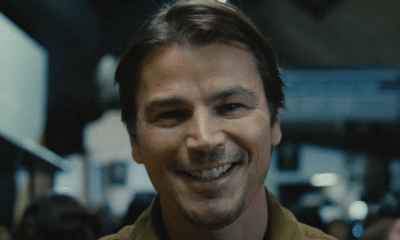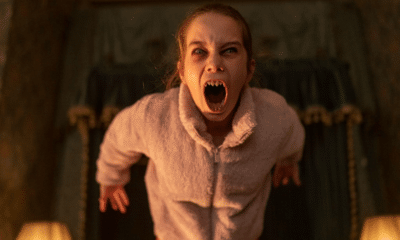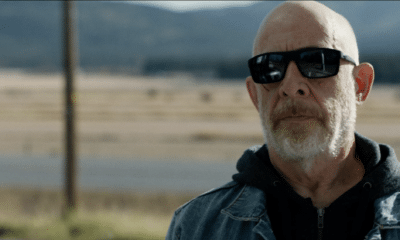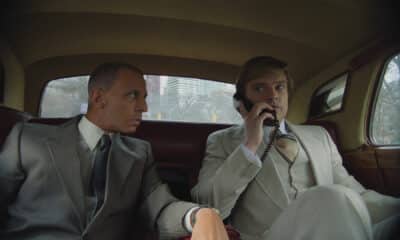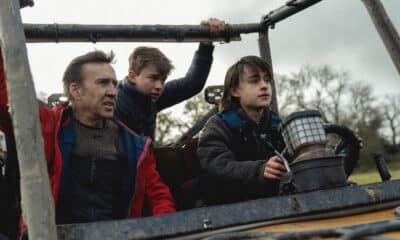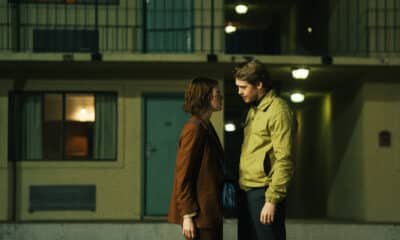The Oak Room screens as part of this year’s Fantasia Film Festival, which like many festivals around the world due to the Covid pandemic, has moved online. The film, originally a stage play of the same name, is directed by Cody Calahan, and stars Breaking Bad‘s RJ Mitte and Orphan Black‘s Ari Millen. The story unfolds over the course of one evening when Mitte’s drifter, Steve, returns to his hometown to collect his estranged father’s ashes. After getting caught in a blizzard, he holes up in the local bar with bartender and family friend, Paul (Peter Outerbridge), is working. It appears Steve had amassed a fair amount of debt before leaving the town; with no money to his name he barters his balance wiped clean in exchange for a story. So begins a night of disturbing stories that leads to brutal violence.
Ahead of the premiere, we had the chance to sit down with director and co-writer, Cody Calahan, as well as stars, RJ Mitte and Ari Millen, to find out more about The Oak Room.

How are you guys feeling about the screening at Fantasia? It’ll obviously be a little different this year with the festival being online only.
CODY CALAHAN: It’s funny because myself and Ari, and Chad [Archibald] the other producer, we’re all from Toronto, but there’s something about Fantasia that’s always kind of felt like a home screening. Everybody from our crew would always go, so it felt like the home town premiere, even though we’re not actually from Montreal. It’s a little sad, but obviously everyone is in the same boat. We’re excited; Mitch Davis and everybody at Fantasia has done an amazing job at setting up the virtual screenings and such.
You’re all doing a Q&A after the screening too right?
CC: Yeah, we’re doing it through Zoom or some similar thing, but we’ll all be there.
The story started off as a play, what challenges did you encounter adapting for film?
CC: Lots (Laughs). It was funny how it started because Ari was actually in the play as the same character he plays in the movie. This was back in 2013, and he brought me the script, obviously a while ago now. He was pushing saying, ‘you’ve got to read this, it’ll make a great movie.’ Just the idea of adapting a play into a screenplay was terrifying so I put off reading it, but as soon as I read it, it jumped off of the page so much. Not much in the setting or the scenes, but just the dialogue itself and how the character’s dialogues danced with each other and propelled the story. That you could actually adapt it and keep the dialogue the same because that was such the driving force. Rather than having this play that gets adapted, but doesn’t have enough cinematic value to sort of break that on-screen wall; this did, but it relied so much on the dialogue. There was a lot of adapting and trying to figure out what to keep and what to lose and what to add. But really we stay true to the play. I mean Ari can speak to it more because I’ve been living with the movie so much I actually can’t remember what we added at this point in time. But we did stay pretty true to the story and the themes. It was just about tweaking stuff, but Ari you might have a different perspective because you did both?
ARI MILLEN: Yeah, I would say definitely the movie really does stay true to the play and the original story. The play was originally one act, something around fifty pages, maybe less, so they had to come up with a bit more story-line, and added in a couple more characters. I think Gordon was an added character, but for the most part, the twists and turns and the main five scenes are right out of the play. Maybe just a few lines cut for cinematic flow.

So how was it revisiting the character Michael, did you change anything up?
I mean, yes and no. The writing I felt was strong enough that there wasn’t [any need], and all props to Peter Genoway the writer. The writing was solid and strong and didn’t need a lot of extrapolation from me. I felt that it was all there, and I got to bring my own interpretation to it. But from the play to the movie, I think there was about five years in-between so you know, life happens. You evolve as a person and I got a second chance at it. Realisations I had about the character later on or things that I wanted to go for differently, yeah I got to tweak them. For the most part though all I really did was rely on the writing and trust Cody to guide me.
RJ, at what point did you get involved, and what what it about Steve that intrigued you?
RJ MITTE: Cody reached out to me, and when I read it the whole thing, it just jumped off of the page. You’re talking now about this adaptation of a play and it read very much like a play, and you saw it as a play. But at the same time it had this cinematic value of something so much more. Really it was a testament to what the writing was, to what it had been, and it just needed that pull-together of all these minds to create something great. I think that’s what we did. I think there’s many aspects of Steve that were a lot of fun and it was a unique story that you don’t see often.
The film unfolds with a series of campfire stories, and the action is still with the emphasis on dialogue. Did that pose any challenges for you as actors?
RJM: I think the challenges in themselves are always going to be do with the project. But I think with this one particularly, we all had a very clear vision of what this was. I don’t think anyone saw it differently to what you see from the page to what you see on the screen. So I think that really made our lives easier.
AM: And also, we were given the freedom – at least in the scenes I was in – we were given the freedom of long takes. Instead of shooting a small chunk here, a small chunk there, we sometimes would do five/six pages or more all in one take. So like a play, the flow could happen. Then Cody would tweak something or he would know where to push in on something on the next take. It was more free-flow like a theatre production compared to the more controlled environment that film can often put on the actor.
CC: When we designed the sets, Jeff Maher, the director of photography, besides moving maybe one light for close-up, he did a good job of lighting the whole set so that the actors could go anywhere. So if there was a spontaneous moment, there was no worry about whatever they wanted to do, they could do it. I think there were definitely takes that were easily fifteen minutes, where actors would run through almost the entire scene. Maybe we would pause at a couple of spots, but we just left the camera running. I don’t know, there’s just something you get from being immersed in it that long, that you start forgetting it’s a movie and there’s takes and there’s cuts and you’re back on stage. You get a different performance. It’s something I’ve never done before and it was definitely an experiment, but I think it shows that it works.
Given that it was so stripped back, without all the fancy distractions, and the camera being purely focused on you, as actors did you feel any extra pressure to get everything right?
RJM: I think that’s more of an opportunity for us. I think it was the opposite of pressure, I think what we felt was this immense urge to do this right and to do it great and to explore these things. I think for us, I don’t know if it’s pressure or just the opportunity to grow as actors. I think we went for it. Every actor went for it, Peter and Ari and everyone there just poured their heart into this and hoped for the best. It was hard to find, but we have it here.

Cody, The Oak Room is very different tonally and stylistically to the films that you’ve directed before, what was it about the project that made you want to pursue it?
CC: I think, not that I wasn’t challenged by the movie that I did previously to The Oak Room, but I had sort of found a niche, and Black Fawn got really good at a certain style of film-making. I think the one thing about this that got me most excited was that it would be something completely new and a giant challenge compared to anything I had done before. Besides the fact that it was a really interesting story and a great script, just the challenge in approaching it. How do we shoot this? How do we make five pages of what seems like simple dialogue really jump off the page without moving the camera too much to take away from the actor’s performances. There were all these things that I had never done before and it felt, career-wise, like a mature step I guess.
The way in which the narratives play out, it’s almost like the film Inception or something with its story-within-a-story, and then reveals that that was inside another story. Are you guys ready to melt some brains with this film?
RJM: Always.
CC: I just hope that we did enough that you could have two people watch it and then hopefully they could have a discussion on who’s who, what’s real and what’s not, whose coming through at the end.
AM: And disagree about what the ending is.
CC: Exactly. I mean there’s enough hints and props that push it certain ways. Some things suggest that maybe this story isn’t real and some things suggest that it is real. I wouldn’t want to say what I had in mind, but there were definitely days where we were on set shooting scenes and there would be moments where Ari would have an idea in his head about what was real and I did too. Sometimes they weren’t the same thing. It made it a really interesting process.
When I was watching the film, I really wanted it to be colder outside so I could enjoy it with a nice mulled wine and something disgustingly chocolatey next to a roaring fire. What would be your perfect viewing scenario for the film be?
RJM: Snowstorm or a blizzard.
CC: We had talked at one point before Covid about trying to do a Toronto premiere, and do it at one of the dingy bars at Toronto. I feel like a pint of beer and a fire going would be the perfect setting for this.
AM: I was thinking earlier about how with Covid and the isolation that everyone is feeling, might be feeling, is kind of… in a way, it’s the next best scenario to going to Fantasia and being surrounded and being in the audience feeling the energy. It’s kind of perfect that’s everyone is separated and cut-off the way that these small towns are cutoff during snowstorms. It’s kind of poetic in a way.
CC: That was good, use Ari’s answer.
RJM: I concur.

In an odd way, despite being made before the pandemic, given the limited locations and cast ,The Oak Room is almost an example of how you can make a film with limited resources work. Do you think people will look at this as an example of how future projects could work?
CC: Yeah, I mean it’s weird because it’s probably as Covid-safe as you can get with a set and crew. There was only one person per position. I mean, I did most of the wardrobe, and the camera team was really small. Jeff’s team, he had like one in each department, I don’t know in total, but it was definitely the smallest crew I’ve ever had for a film. It was definitely the fastest we’ve ever shot a film as well. It’s interesting that it’s turned out that way, but yeah, it’s a great example.
AM: I also think people don’t realise what Black Fawn is able to accomplish in all their movies on the budgets they have. I think people would, for any movie that Black Fawn have done, I guarantee you that everyone would be guessing far above what the budget actually was. I had a conversation with one of Breakthrough’s execs, Ira, and he was saying one of his favourite things to do is when he takes one of Black Fawns movies to sell, is he asks people what they though the budget was and they normally guess about ten times above, and that’s still by Hollywood standards a very low budget film. So what Black Fawn is able to accomplish with the resources they have is quite astounding.
The Oak Room deals with the relationships between men and their fathers, I am guessing that these are all experiences that you can all relate to in some capacity?
CC: Yeah, it was interesting how the shoot happened. We shot all the exterior stuff, the flashbacks, the pig story, the hitchhiking story, we had shot all that stuff during the winter and then we went on hiatus for a bit while we did some casting. So we shot the rest of the film two or three months later, and in-between shooting the first and second part, my son was born. So I went through drawing comparisons to my past, because I grew up in a tiny town; the house I grew up in was about a thirty minute bike ride to the nearest neighbour. It was very isolated, so I was drawing comparisons to my relationship with my father. Then in-between, my son was born, and of course your perspective on everything is heightened and changed so it was interesting to be able to have that experience between shooting it.

When people sit down to watch The Oak Room, what do you each hope that people will get from the experience?
CC: For me personally, it’s that you don’t need all the bells and whistles to tell a great story. You just need talented actors and a good script. You don’t need explosions and all that to be entertained. I feel that the simplicity in this is what makes it the most enjoyable, at least for me.
AM: I hope that people just enjoy the performances. I hope that people come away thinking, ‘I didn’t know that RJ could do that, I didn’t know that Ari was gonna do that.’ I just hope that people enjoy not being distracted by… gimmicks is the wrong word, but explosions or car chases, or running through the streets. This is a very consolidated script. It’s all about the performances, so I hope that they see the love and care that all the actors put into it, and the phenomenal performances that everyone gave. That’s the thing, this really did live or die on the performance. I know Cody discussed going into it how scared we were about..it could fail, it was not an easy thing to do. But it far surpassed anything that I hoped for, so it’s definitely something that I’m proud of, and I hope people enjoy it.
As a new parent do you find yourself looking at films and things differently?
CC: For sure. I’m now more conscious of what I’m making. Especially the horror films. Not that I wouldn’t have made anything that I’ve made previously. I just think my perspective has changed now and there’s a consciousness of what maybe I should be doing. Not just for my son, but in general. You’re perspective on the world widens quite a bit. We went into production on a new movie immediately after this one and it was funny because it’s different to anything we’ve done before, and I found that it was odd shooting the really violent scenes. I guess I’ve gotten sensitive since the last gross movie I’d made.
So might you move Black Fawn into kids movies?
CC: (Laughs) Maybe, you never know… But I do think we’re widening what we’re doing. A lot of the projects that we’re doing now are more in the thriller, more character driven. I think it started with I’ll Take Your Dead, but we’re in development on a lot of stuff that’s… a bit more mature maybe is the way to put it.
When people sit down to watch The Oak Room, what do you each hope that people will get from the experience?
CC: For me personally, it’s that you don’t need all the bells and whistles to tell a great story. You just need talented actors and a good script. You don’t need explosions and all that to be entertained. I feel that the simplicity in this is what makes it the most enjoyable, at least for me.
AM: I hope that people just enjoy the performances. I hope that people come away thinking, ‘I didn’t know that RJ could do that, I didn’t know that Ari was gonna do that.’ I just hope that people enjoy not being distracted by… gimmicks is the wrong word, but explosions or car chases, or running through the streets. This is a very consolidated script. It’s all about the performances, so I hope that they see the love and care that all the actors put into it, and the phenomenal performances that everyone gave. That’s the thing, this really did live or die on the performance. I know Cody discussed going into it how scared we were about..it could fail, it was not an easy thing to do. But it far surpassed anything that I hoped for, so it’s definitely something that I’m proud of, and I hope people enjoy it.
Should we ever get out into the world again, RJ and Ari have you got your eyes on your next projects?
AM: I’ve got something coming up in a couple of weeks that is completely pandemic safe. It’s all green screen and then there’s going to be a reader for everyone so essentially there’s no turnaround time, everything is lit. It’s going to be its own weird and wacky experience. I guess it’ll be more concentration and imagination, but I’m kinda excited to see how it goes because it might be a precursor as to how things might have to go.
RJM: Yeah, we got some ideas. The world is still moving forwards so we’ll see what the future holds.
The Oak Room screens at Fantasia on both 24th August and 31st August 2020.
Kat Hughes is a UK born film critic and interviewer who has a passion for horror films. An editor for THN, Kat is also a Rotten Tomatoes Approved Critic. She has bylines with Ghouls Magazine, Arrow Video, Film Stories, Certified Forgotten and FILMHOUNDS and has had essays published in home entertainment releases by Vinegar Syndrome and Second Sight. When not writing about horror, Kat hosts micro podcast Movies with Mummy along with her five-year-old daughter.

Latest Posts
-


Film Trailers
/ 1 day agoM. Night Shyamalan’s ‘Trap’ trailer lands
Anew experience in the world of M. Night Shyamalan.
By Paul Heath -


Film News
/ 2 days agoFirst ‘Transformers One’ teaser trailer debuts IN SPACE!
The animated feature film is heading to cinemas this September.
By Paul Heath -


Film Reviews
/ 2 days ago‘Abigail’ review: Dirs. Matt Bettinelli-Olpin & Tyler Gillett (2024)
Matt Bettinelli-Olpin and Tyler Gillett direct this new horror/ heist hybrid.
By Awais Irfan -


Film Trailers
/ 2 days agoNew trailer for J.K. Simmons-led ‘You Can’t Run Forever’
A trailer has dropped for You Can’t Run Forever, a new thriller led by...
By Paul Heath
